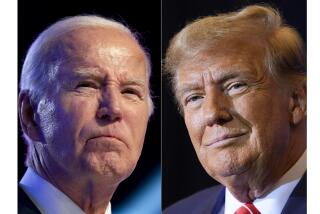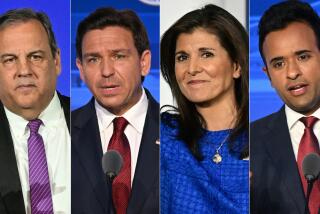Tsongas, Clinton Still Must Demonstrate Electability
- Share via
WASHINGTON — Can New Hampshire primary winner Paul E. Tsongas demonstrate that his appeal is not just regional but national? Can runner-up Bill Clinton use the moral victory he claimed in New Hampshire to generate momentum in the next round of delegate contests?
The answers to these questions are the key to the rest of the struggle for the ’92 Democratic nomination. Also lurking in the shadows is the chance that one of the other three major Democratic candidates--Iowa Sen. Tom Harkin, Nebraska Sen. Bob Kerrey or former California Gov. Edmund G. (Jerry) Brown Jr.--could somehow move forward and further complicate the race.
But the clearest message from Tuesday’s vote in the Granite State was that, while Tsongas’ and Clinton’s focus on economic regeneration appeals to recession-weary residents, both of them still need to prove themselves to voters and to party leaders skeptical about their chances of winning in November.
As part of that process, both campaigns Wednesday showed signs of sharpening the differences between them, which have been relatively muted up to now.
At an Atlanta rally for Arkansas Gov. Clinton, key ally Georgia Gov. Zell Miller lashed out at Tsongas for supporting reductions in cost-of-living adjustments in entitlement programs such as Medicare, for opposing a middle-class tax cut and for opposing the death penalty except for convicted drug dealers.
Former Massachusetts Sen. Tsongas, in conversations with reporters and in a speech to a rally in Baltimore, noted his strong support for abortion rights, his early support for gay rights and his strong environmental record as points on which he can be differentiated from Clinton.
For the time being, Clinton’s escape from a disaster at the polls in New Hampshire appears to have muffled talk in Washington about a new candidate entering the race to head off a potential loss in November.
“I personally don’t expect to see it,” said House Speaker Thomas S. Foley (D-Wash.) when reporters asked him about prospects of a new candidate, such as House Majority Leader Richard A. Gephardt (D-Mo.) or Texas Sen. Lloyd Bentsen, entering the race. “The front-runner is Clinton because he did well so far from home.”
“The action is on hold for a while,” said Rep. Sam Gejdenson of Connecticut, one of a number of House Democrats who have been trying to persuade Gephardt to enter the race. “The way the primary turned out, people want to give Tsongas and Clinton a chance to see how they can do.”
But taking advantage of this opportunity is a ticklish challenge for both Tsongas and Clinton. The choice of battlegrounds must be considered carefully, with potential gains weighed against the risk of an embarrassing defeat and against the drain on funds and other resources.
“You don’t want to get involved in a state where in order to win you might have to dump a bundle of money,” said one Clinton strategist who spoke on the condition that he would not be identified.
“You also don’t want to get caught in a cross-fire in a multi-candidate primary where the other candidates are shooting at you from all sides,” said Paul Begala, a consultant to the Clinton campaign.
Given these uncertainties, campaign plans for the two top contenders are still in a state of flux. But as things stand now, Tsongas intends to compete in the South Dakota primary Tuesday. He will campaign in Sioux Falls Friday and return there Sunday for a televised candidate debate.
For Tsongas this is a low-risk, high-gain situation. If he finishes behind Kerrey, who ran third in New Hampshire, and Harkin, who was in fourth place, it will be no great embarrassment because both Midwestern candidates are considered to have a regional advantage in South Dakota.
A victory, on the other hand, would be a feather in his cap--offering evidence of the strength of his message far from his home grounds.
Tsongas had also planned to make a visit Saturday to South Carolina, which votes March 7, to challenge Clinton on his Southern home turf. But Wednesday the trip was canceled so that Tsongas could campaign in Maine, which holds its caucuses Sunday.
Tsongas is worried about threats in his own New England region from Kerrey, whose campaign manager Tad Devine has extensive contacts in Maine, and from Brown, who has built a large organization there.
Faced with primaries in three states on March 3, Tsongas plans to make his big push in Maryland--where his aides claim to have made significant organizational progress--and lesser efforts in Colorado and Georgia, which is in Clinton’s home region.
As for Clinton, his aides say he is in a better position than Tsongas because of his bigger treasury. “One of the fundamental rules of presidential campaigning is that the candidate with the most resources can campaign in the most states,” says Begala. “That’s why Clinton is the only truly national candidate in the race.”
But Clinton’s tentative plans seem relatively cautious. Campaign sources say he is considering only a “modest” commitment to South Dakota and a limited involvement in Maryland, probably targeting four or five of the state’s eight congressional districts.
Looking ahead to the Super Tuesday states on March 10, where 783 delegates are at stake out of the 2,144 needed to win the nomination, it is unclear where Clinton and Tsongas might meet head to head. Given the advantages Clinton has in finances and other resources, it may be possible for him to target delegates in widely scattered congressional districts without the risk of a full-fledged confrontation in any one state.
The main Clinton target on March 3 is expected to be Georgia, where he can count on the active backing of Gov. Miller, who laid into Tsongas at Wednesday’s noontime rally in Atlanta.
“The Democratic Party in 1992 is no more going to nominate an anti-death penalty, anti-middle class politician as our candidate for President than George and Barbara Bush will be inviting Pat Buchanan over for Sunday supper,” Miller said.
Clinton avoided direct criticism of Tsongas in his rally speech. Instead, he largely restated his central campaign theme of devising a new politics “beyond liberal and conservative.” But as he has in other appearances before biracial audiences in the South, Clinton delivered with unusual passion his accusation that President Bush has attempted to divide the electorate by race.
“I’m a Southerner,” he told the large crowd that gathered in the CNN Center atrium. “We were raised in a region that was kept poor and dumb and backward by having our people divided race against race. And don’t kid yourself, that’s exactly what our national leadership is trying to do with this rhetoric about quotas.”
Despite Miller’s attack on Tsongas’ stand on capital punishment, the main debate between Tsongas and Clinton will likely come on economic questions.
Clinton, in several speeches and in a series of television interviews, has sought to portray Tsongas as focusing too narrowly on providing incentives for business and as offering pain rather than hope.
Clinton and his advisers calculate that their program, which includes a tax cut for middle-class voters and a program to allow all students to borrow money to go to college, will have more appeal to economically hard-pressed voters. Above all, Clinton will argue, a President must be able to do more than lay out an economic strategy.
“He’s right,” Tsongas said when asked about that argument. But he added: “The first part (the economic plan) is important” and “their economic plan does not work. No one argues that what Bill puts forward is more viable than my economic plan, except Bill.
“If you add up all the programs he’s committed to and look at the numbers,” Tsongas said, Clinton’s program would simply cost too much.
On the other hand, Tsongas said, he admires Clinton far more than his other rivals for the nomination. And although he noted that his negative ratings in polls were far lower than Clinton’s, he avoided comment on the character issues that have damaged Clinton’s campaign in the last four weeks.
“Who’s perfect?” he asked when reporters questioned him on whether he thought Clinton’s character should continue to be an issue.
Asked what his own character flaws were, Tsongas cited a tendency “to cross the border into being moralistic. It’s not very pretty. I plead guilty.
“If you have two front-runners, I’d rather the other be him,” Tsongas added, referring to Clinton. “I don’t, with all due respect, think the others have programs they’ve thought about” for what they would do if elected. “At least he’s attempted to put some meat on the bones,” Tsongas added. “I think it’s good to have two people with strong ideas.
“We’re good friends,” he said. “That will now be tested.”
Times staff writers David Lauter and Ronald Brownstein contributed to this story.
More to Read
Get the L.A. Times Politics newsletter
Deeply reported insights into legislation, politics and policy from Sacramento, Washington and beyond. In your inbox twice per week.
You may occasionally receive promotional content from the Los Angeles Times.










